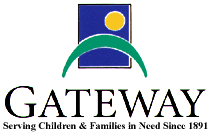Gateway: Difference between revisions
Jump to navigation
Jump to search
| Line 7: | Line 7: | ||
Currently, Gateway provides services in 10 program areas: | Currently, Gateway provides services in 10 program areas: | ||
* '''Residential Program''': The "Susanna Campus" on [[Messer Airport Highway]] offers youth aged 12–18 with severe emotional and behavioral issues intensive residential treatment in a safe and nurturing environment. Six and twelve month programs involve family members in therapy. | |||
* '''Rushton School''': An accredited K-12 public school, Rushton School offers intensive behavioral management training along with the regular curriculum. | |||
* '''Community Connections''': Gateway's Community Connections outreach goes into schools, churches and community centers with tobacco, drug and alcohol abuse prevention, conflict resolution, and family communication programs. | |||
* '''Consumer Credit Counseling''': Through its Consumer Credit Counseling Service (CCCS), Gateway provides debt management, bankruptcy avoidance and money management training. | |||
* '''Representative Payee Program''': Gateway offers this program to help retirees protect and manage their Social Security benefits effectively. | |||
* '''Family Counseling Offices''': Gateway provides specialized counseling services for children, adults, seniors, couples and others. The fee is on a sliding scale, based on client income. | |||
* '''Violence Intervention Program''': The Gateway Violence Intervention Program (GVIP) provides group sessions on conflict resolution and violence prevention for domestic violence offenders, as well as a range of anger management and theft intervention programs. | |||
* '''Independent Living Program''': In Gateway's ILP, young people are provided an opportunity to move into an agency-leased apartment with the support of staff available to them on a 24-hour emergency basis. They are expected to be employed or in school and to gradually assume full responsibility for their lives. Staff assists in skill development with clients in managing budgets, seeking and holding jobs, establishing community support systems, continuing parental education and child development and becoming responsible members of their community. | |||
* '''Therapeutic Foster Care''': This program places special-needs children into the custody of foster care providers who have received specialized training. | |||
* '''Shelby County Wraparound Program''': In many cases, families who are at risk of having children removed from the home can be held together safely through “wrapping” services around them. [[Shelby County]] families who are at risk are referred to Gateway by the [[Alabama Department of Human Resources]], and social workers provide a wide range of services to help strengthen the families so they can remain together in a healthy way. | |||
Gateway provides specialized counseling services for children, adults, seniors, couples and others. The fee is on a sliding scale, based on client income. | |||
In ILP, young people are provided an opportunity to move into an agency leased apartment with the support of staff available to them on a 24 hour emergency basis. | |||
==References== | ==References== | ||
Revision as of 18:57, 12 September 2010
Gateway is the oldest continuously operating social service agency in Birmingham. The agency provides services ranging from family counseling and therapeutic foster care to anger management classes and consumer credit counseling.
The agency began as the Mercy Home in 1891, founded by the Women’s Christian Temperance Union to provide basic social services to women and children. It was a charter member of the Community Chest, which became United Way of Central Alabama. The agency name was changed to Gateway in 1968, to Family and Child Services in 1977, then back to Gateway in 1999.
Service areas
Currently, Gateway provides services in 10 program areas:
- Residential Program: The "Susanna Campus" on Messer Airport Highway offers youth aged 12–18 with severe emotional and behavioral issues intensive residential treatment in a safe and nurturing environment. Six and twelve month programs involve family members in therapy.
- Rushton School: An accredited K-12 public school, Rushton School offers intensive behavioral management training along with the regular curriculum.
- Community Connections: Gateway's Community Connections outreach goes into schools, churches and community centers with tobacco, drug and alcohol abuse prevention, conflict resolution, and family communication programs.
- Consumer Credit Counseling: Through its Consumer Credit Counseling Service (CCCS), Gateway provides debt management, bankruptcy avoidance and money management training.
- Representative Payee Program: Gateway offers this program to help retirees protect and manage their Social Security benefits effectively.
- Family Counseling Offices: Gateway provides specialized counseling services for children, adults, seniors, couples and others. The fee is on a sliding scale, based on client income.
- Violence Intervention Program: The Gateway Violence Intervention Program (GVIP) provides group sessions on conflict resolution and violence prevention for domestic violence offenders, as well as a range of anger management and theft intervention programs.
- Independent Living Program: In Gateway's ILP, young people are provided an opportunity to move into an agency-leased apartment with the support of staff available to them on a 24-hour emergency basis. They are expected to be employed or in school and to gradually assume full responsibility for their lives. Staff assists in skill development with clients in managing budgets, seeking and holding jobs, establishing community support systems, continuing parental education and child development and becoming responsible members of their community.
- Therapeutic Foster Care: This program places special-needs children into the custody of foster care providers who have received specialized training.
- Shelby County Wraparound Program: In many cases, families who are at risk of having children removed from the home can be held together safely through “wrapping” services around them. Shelby County families who are at risk are referred to Gateway by the Alabama Department of Human Resources, and social workers provide a wide range of services to help strengthen the families so they can remain together in a healthy way.
References
- Federal Reserve Statistical Release (January 8, 2007) - accessed February 2, 2007
- Garrett, T. and Ott, L. (October 2005) “Up, Up and Away: Personal Bankruptcies Soar!”. The Regional Economist - accessed February 2, 2007.
External links
- Gateway website
